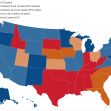On December 15, the U.S. Court of Appeals for the Eighth Circuit denied a request to rehear a decision that puts tighter restrictions on abortions in Arkansas.
The request was filed by the ACLU and the Center for Reproductive Rights and was done so in an effort to block new restrictions on abortion that both organizations deem would be detrimental if they were to go into effect.
Four of the new restrictions at the center of the controversy include the following:
- There will be a ban on abortion after 14 weeks of pregnancy.
- Patient confidentiality will be eliminated because parents, partners, and other family members of the patient will be notified of an abortion that takes place.
- Health care workers will now be required to report teenage abortions to local police. The state crime lab will also be legally allowed to hold the patient's medical and personal information.
- Physicians will be allowed to request an array of medical records without needing medical justification for doing so. With this new medical overreach, physician-patient confidentiality will be violated, and there is the potential that access to an abortion will be delayed or blocked because of this.
Without any court intervention, these new laws could go into effect as early as December 22. As a last-minute attempt to keep the new regulations from going into effect, the ACLU and the Center for Reproductive Rights filed for emergency relief on December 21.
These new restrictive laws are just four of the already 480 current abortion-related laws that limit access to abortions or put tighter restrictions on getting an abortion in the state.
The executive director of the Arkansas ACLU, Holly Dickson, says of the new restrictions, "These extreme bans and restrictions would push abortion care out of reach to many who need it and brazenly intrude on people's most personal medical decisions. While we're disappointed the Eighth Circuit declined to rehear the case, this fight is not over. The people of Arkansas have a constitutional right to control their own lives and make their own medical decisions, and we'll never stop fighting to protect it."
Ruth Harlow, the senior staff attorney for the ACLU’s Reproductive Freed project, echos the same frustration in her statement: “These Arkansas laws represent the worst motives of anti-abortion politicians: to shame, stigmatize, and humiliate abortion patients, and to make abortion care difficult if not impossible to access. While we’re disappointed with this order from the Eighth Circuit, we’re not backing down — this fight is nowhere near over. To the state of Arkansas: We’ll see you back in court.”
Abortion in Arkansas
Arkansas remains one of the most restrictive states for abortions to take place in. As of 2017, there were only four facilities that provided abortions, and three of those were clinics. As of September 2020, there has been an increase in restrictions for patients who were in need of an abortion. Some of these restrictions include the following:
- Anyone under the age of 18 must have parental or guardian consent before receiving an abortion.
- Public funding for an abortion is an option only in life and death cases.
- Abortion clinics must undergo rigorous, unnecessary, and burdensome standards regarding the facility, equipment used, and even staffing.
- Any health plans that are offered under the state's health exchange through the Affordable Care Act can cover abortions only if the pregnancy is life-threatening or was the result of rape or incest.






